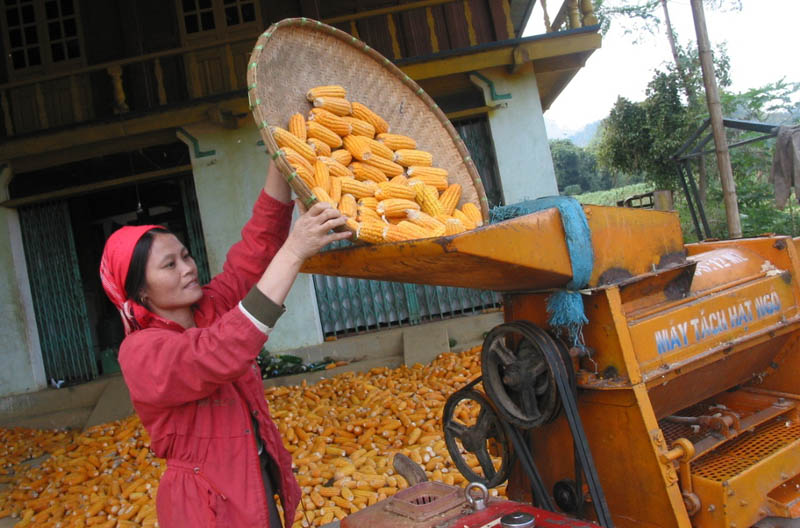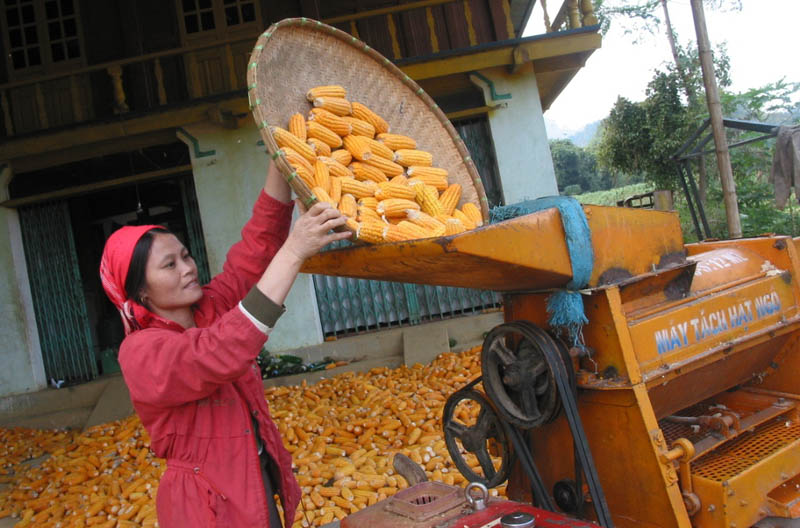
(HBO) – Ethnic minority-inhabited areas in Mai Chau district of northern mountainous Hoa Binh province have flourished thanks to state-supported programmes and projects. Investment has been poured into upgrading infrastructure and stepping up production, thus reducing poverty, eradicating hunger and improving living conditions of the Mong ethnic minority group.
We
visited Tra Day hamlet in Pa Co commune during the main harvest of Shan Tuyet
green tea on all mountains and hills. Sung Y Sua, a tea farmer, said
excitingly: "Thanks to varieties, fertilizers and techniques provided under the
Poverty Reduction Project, tea farmers in the hamlet now have a better life.
There are no more poor households here.”
The project, carried out since 2011, has
connected with enterprises to provide saplings, technical assistance and
establish a tea growing area covering dozens of hectares and a consumption
chain in Pa Co commune. Hills have been planted with Shan Tuyet green teas and
bitter teas, helping improve living conditions of local Mong ethnic minority
people. The commune got rid of the list of poor communes in 2017.
A
household in Khan Ha hamlet, Ba Kham commune (Mai Chau district) has escaped
from poverty thanks to assistance from the Programme
135 in terms of production
tools and new maize varieties.
Ba Kham commune has witnessed remarkable
socio-economic changes since programmes and projects in support of ethnic
minority people were initiated. Inter-hamlet roads among Khan Ho, Khan Thuong
and Khan Ha hamlets have been expanded and upgraded to facilitate trading
activities and transportation of agricultural materials and products.
The Programme 135 and the Poverty Reduction
Project have supported local farmers’ production models, such as growing
Japanese sweet potatoes and ginger and raising pigs and cows. Their living
conditions have been improved with the annual per capita income reaching 9.6
million VND in 2016, and the rate of poor households falling below 50 percent.
Mai Chau district now has eight extremely
disadvantaged communes, namely Cun Pheo, Na Meo, Tan Mai, Tan Dan, Hang Kia, Ba
Khan, Noong Luong and Pu Bin. In 2015 – 2016, nearly 23.4 billion VND (over 1
million USD) was allocated from the Program 135 under Decision 551, dated April
4, 2014 of the Prime Minister for the communes. The programme focused its
support on building infrastructure, with 40 transport, education, irrigation,
communal works built. Priorities were also given to ethnic minority farmers’
production activities.
Many other policies have also benefited ethnic
minority-inhabited areas, including those supplying residential and production
land, and clean water. To date, all needy households have been supplied with
clean water for the daily use, with total cost of 1.2 billion VND (52,800 USD).
Up to 100 households have been provided with agricultural machines and tools
under the job shifting assistance programme. A total of 18,263 people have been
given saplings worth over 1.4 billion VND (61,600 USD).
As many as 530 households in the district have
been provided with preferential loans, worth over 4.2 billion VND (184,800 USD)
to raise cattle and buy agricultural machines. All the loans have been
effectively used and none are over due. Up to 2,749 households have been
enabled to get loans from the credit programme for poor and policy
beneficiaries, with total outstanding debt of nearly 77.8 billion VND (3.4
million USD).
Bui Minh
The emulation movement "Hoa Binh joining hands to build new-style rural areas” has been widely spreading, becoming a driving force that motivates the localities to renew rural landscapes and improve the material and spiritual lives of the residents. In this movement, the people play a central role-both as the main implementers and direct beneficiaries of its outcomes.
In response to the global digital revolution, Hoa Binh Newspaper is transforming itself into a modern and multi-platform media hub, blending cutting-edge technology with a restructured newsroom and a new generation of tech-savvy journalists.
Hoa Binh province’s Association of the Elderly recently held a conference to review the project on expanding the inter-generation self-help club model until 2025.
In a move to implement Resolution No. 57-NQ/TW, issued on December 22, 2024 by the Politburo, which targets breakthroughs in science-technology development, innovation, and digital transformation, the Hoa Binh provincial Department of Health has issued a plan to roll out the "Digital Literacy for All” campaign within the local health sector.
An Nghia Commune (Lạc Sơn District) is one of the communes that achieved the tha standard of the national new rural area in 2018. Entering a new development phase, the commune is now trying to meet the criteria for the advanced new rural development. With the strong political will and the public consensus, the commune is gradually overcoming the challenges to reach this goal, aiming for the sustainable development.



